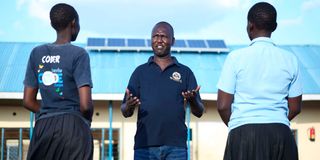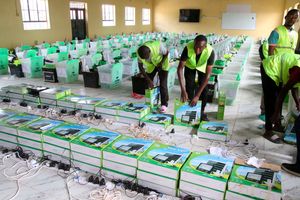My second chance at life: Inside the school where refugee girls dare to dream again

Peter Eyen, the principal of Tarach Secondary School in Turkana West, Turkana County speaks to some of the students who have been beneficiaries of a safe space in the school during an interview on October 22, 2024.
What you need to know:
- At Tarach Secondary School, a groundbreaking 'safe space' initiative is transforming lives by protecting girls from GBV and providing essential supplies like sanitary towels
- For students like Alia, a war orphan from Sudan, this safe haven offers not just counselling and basic necessities, but also hope for a future.
- Through professional counselling, peer support, and practical assistance, the school has created a sisterhood of survival and success.
In the heart of Turkana West, Kenya, where the sun beats down relentlessly on dusty paths and modest buildings, an extraordinary transformation is taking place.
At Tarach Secondary School, just a few kilometres from Kakuma town, hope blooms in an unlikely place: a dedicated safe space where girls can finally speak their truth.
When Peter Eyen arrived as the school's principal in February last year, what he discovered was heart-breaking: more than ten students were pregnant, their education hanging by a thread. But rather than accept this as inevitable in a region hosting multiple nationalities and complex social challenges, Eyen decided to act.
"What we witnessed wasn't just a statistic – it was dreams being deferred," Eyen explains, his voice carrying the weight of his mission.
"In an urban area like Kakuma, where refugee and local communities intersect, gender-based violence isn't just a possibility – it's a daily reality we must confront."
The school's response was to create something remarkable: a confidential safe space where girls can seek help without fear of exposure. Here, stories that might never have been told find a voice, and challenges that once seemed insurmountable begin to crack.
Among these stories is Alia Ahmed's*. Having fled Sudan 11 years ago, she carries the weight of war's devastation – parents lost to conflict, siblings whose fate remains unknown. Now living with a guardian in Kakuma Refugee Camp, she faces the daily struggle of securing basic necessities, including sanitary towels.
"The safe space isn't just a room – it's where I can finally breathe," Alia shares, her eyes reflecting both past pain and present hope. "When memories of losing my parents become too heavy, or when discrimination feels overwhelming, I find strength here through counselling."
The impact of this initiative extends beyond emotional support.
"Period poverty is more than just a phrase here – it's a trap that's caught too many of our girls," Eyen explains.
Thanks to support from Film Aid and UNFPA, the school now provides sanitary towels and soap to its most vulnerable students, removing one of the primary barriers to education.
Joyce Ajele*, a local student from Lodwar, has witnessed the transformation first-hand.
"We've created a sisterhood here," she says, describing how peer-counselling helps students address challenges both big and small.
"Sometimes, just knowing you're not alone makes all the difference."
John Sifuma, who heads the Guidance and Counselling department, has seen remarkable changes. With two professional counsellors on staff, the school addresses issues ranging from parental neglect to domestic violence.
"We're not just seeing more girls in school – we're seeing them thrive," he notes proudly. "They're finding their voice, and with it, their power to succeed."
For Alia, the impact has been life-changing. Now dreaming of pursuing counselling at university, she wants to stay in Kakuma to help other refugees facing similar challenges. "Every girl who walks into our safe space carries a story," she says.
"I want to be part of helping them write new chapters filled with hope."
*Names changed to protect the identities of the girls.





